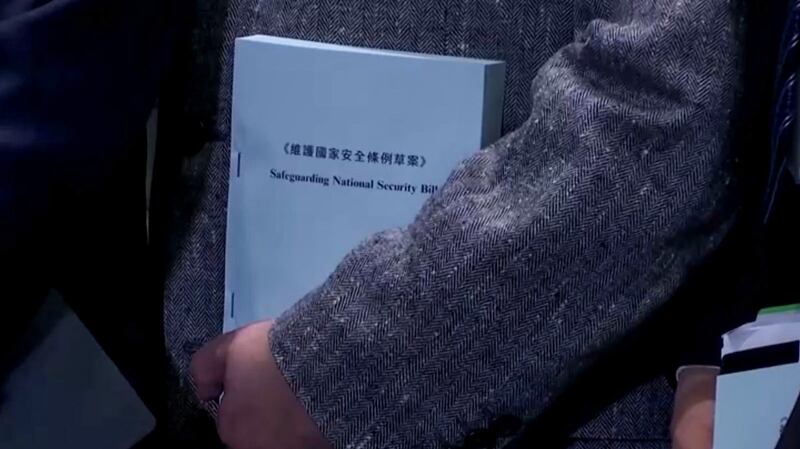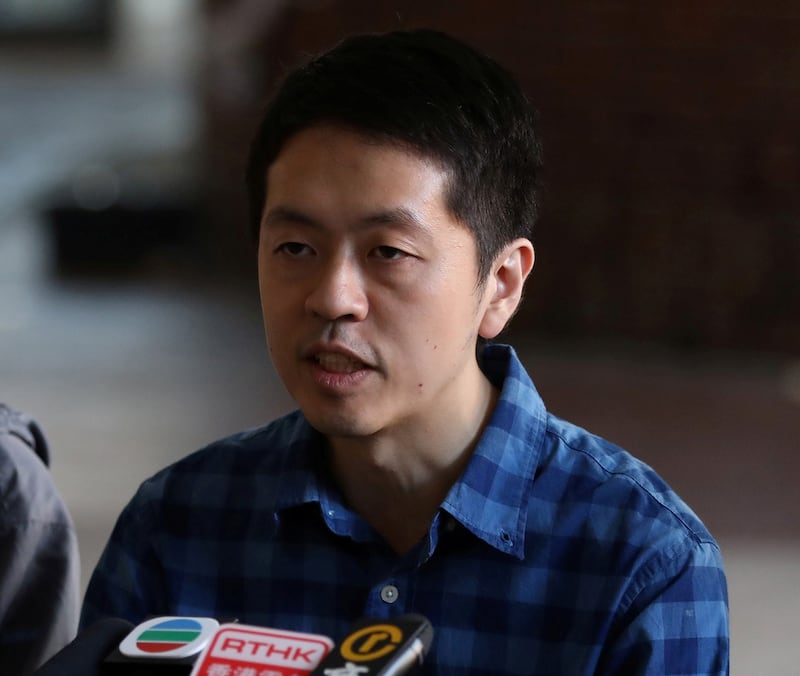Chinese authorities arrested 726,000 people last year, a jump of 47.1% from the previous year, the country’s chief prosecutor told the National People’s Congress that ended Monday amid a crackdown on crimes linked to “hostile foreign forces.”
Authorities also formally prosecuted 1.688 million people last year, up 17.3%, Chief Prosecutor Ying Yong said.
Ying said more than 2.4 million people were "arrested or prosecuted" last year for offenses related to "national security," although he didn't provide a breakdown for each category.
The Chinese authorities have typically employed a highly elastic definition of what constitutes a state secret, and national security charges are frequently leveled at journalists, rights lawyers and activists, often based on material they posted online.
Ying's annual work report on behalf of the Supreme People's Procuratorate said the focus of last year's "strike hard" campaign was crimes linked to "hostile foreign forces" including "infiltration, sabotage, incitement and separatism."
The ruling Communist Party blames "hostile foreign forces" for the "white paper" protests that spread across the country in November 2022 as people vented their anger and frustration, holding up blank sheets of paper as a symbol of what they can't say, about Xi Jinping's three-year long zero-COVID policy.
It also claims that foreign forces were behind waves of mass popular protest in Hong Kong against national security legislation, patriotic education and extradition to mainland China in recent years.
Social unrest
Cheng Xiaofeng, a former police detective from the Zhuzhou municipal police department in the central province of Hunan, said the rise in arrests is likely linked to growing social unrest.
"2024 is the year in which China is heading into a state of social unrest," Cheng told RFA Mandarin. "Various social tensions are emerging, one after the other."
"The official crime data tells us that people are having a hard time, and is a true reflection of the state of society," he said.

Lu Jun, who founded the Beijing-based health non-profit Yirenping, agreed.
"The explosion of these numbers is either due to a rise in social resistance during the past year, or it's due to the Communist Party itself, which may be acting to maintain stability, catch spies ... to ward off a crisis."
He said he knows of many volunteers in the non-profit sector who have been detained and even sentenced during the past year.
"If they're like this in the public welfare sector, then it's even more likely in other fields," he said. "Of course, legally speaking, it's total nonsense."
The nationwide obsession with "hostile foreign forces" is being seen in Hong Kong too, where the authorities are getting ready to pass another law safeguarding "national security" that provides for harsher penalties where foreign forces are deemed to have been involved.
Currently, pro-democracy media mogul Jimmy Lai is on trial for "collusion with foreign forces" under the 2020 National Security Law -- the case against him relies heavily on opinion articles published in Lai's now-defunct Apple Daily newspaper.
Sedition penalties
The law also boosts penalties linked to "sedition," criminalizing online posts or displays that "cause hatred" towards the authorities or "contempt" for residents of China, according to a draft "Safeguarding National Security" bill currently before the city's Legislative Council.
Penalties for "sedition" have been raised from two years to seven years, while "failing to report treasonous acts" carries a maximum jail term of 14 years.

Anyone with links to overseas groups will incur harsher sentences in all cases, according to the bill.
Exiled former pro-democracy lawmaker Ted Hui said the draft bill will "further deprive the people of Hong Kong of their rights."
For example, Hui said many in Hong Kong are hotly supportive of Taiwan, and have gone out of their way to buy its produce amid an ongoing trade war with China.
"In the future, you could be accused of treason and sentenced to life imprisonment if you don't side with the Chinese government," Hui warned, adding that the definition of the crimes under the draft law was overly vague.
"This approach puts Hong Kongers at extreme risk," he said.
The law will also allow police leave to hold a suspect for up to 14 days without charge, a stark contrast to the two days previously allowed.

There are also restrictions on legal representation under the bill, Hui said.
"You can't see a lawyer, and you can't specify which lawyer you see," he said. "People released on bail will also be placed under effective house arrest."
Patrick Poon, a rights researcher at the University of Tokyo, said the new provisions will mean police have similar powers to their counterparts in mainland China.
"The biggest issue [with the draft bill] is that it gives a huge amount of latitude to the police," Poon said. "Catch-all charges will become a serious problem, and there is no way to get a lawyer or to receive legal protection."
"It's exactly the same as the approach in mainland China, and it's a very serious violation of human rights," he said.
Translated by Luisetta Mudie. Edited by Malcolm Foster.
